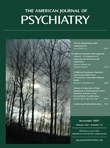A Case of Disulfiram-Methylphenidate Interaction: Implications for Treatment
To The Editor: Low dopamine-beta-hydroxylase activity has been associated with disorders such as attention deficit disorder/attention deficit hyperactivity disorder (ADHD) as well as psychotic symptoms. One underlying mechanism that may be attributable to disulfiram would be its action in blocking dopamine-beta-hydroxylase. We report the case of a possible drug-drug interaction with disulfiram and methylphenidate for the treatment of alcohol abuse and ADHD.
A 33-year-old man was hospitalized for a convulsive episode in an intensive care unit. He was diagnosed with alcohol abuse and was noted to have a past history of alcohol and other substance abuse since the age of 15. After 1 month, he was transferred to another clinical unit where he received a diagnosis of attention deficit disorder. During this stay, he was prescribed disulfiram (400 mg/day), without any noticeable adverse effect. The patient was later discharged, and after returning home he began treatment for the first time with OROS-methylphenidate (36 mg daily). After receiving his first dose of methylphenidate, he rapidly experienced a psychotic-like episode that lasted throughout the morning until the end of the afternoon. He denied any alcohol intake and described the experience as similar to acute cocaine intoxication with visual hallucinations. He discontinued methylphenidate, continued to receive disulfiram and vitamins, and recovered fully.
Two months later, in an outpatient follow-up visit, the patient’s diagnosis of attention deficit disorder was confirmed as the predominantly inattentive subtype according to DSM-IV criteria. His score on the screening portion of the Adult ADHD Symptoms Rating Scale (1) was 5 (out of a maximum of 6). His score on the 25-item Wender Utah Rating Scale was 59, strongly in favor of significant inattentive/hyperactive symptoms in childhood (2) . There was no clinical evidence of psychosis, anxiety, or depression. Three months following this assessment, the patient discontinued receiving disulfiram. He was then prescribed OROS-methylphenidate (36 mg/day). No adverse effect was reported in the weeks thereafter, and the dosage was increased to 54 mg/day over the following 3 months, without adverse effect or recurrence of the psychotic experience.
Our case raises suspicion for a possible drug-drug interaction as indicated by a score of 4 on the Drug Interaction Probability Scale (3) , although it is possible that there were other contributing metabolic factors that might have been identified through serum chemistries at the time of the initial reaction. Since the alcohol-aversive effect of disulfiram persists up to 2 weeks after discontinuation of the drug, a significant washout period should be observed before starting methylphenidate. Alternatively, a nondopaminergic psychostimulant might be preferred for the treatment of attention deficit disorder/ADHD when concomitant disulfiram is mandatory.
1. Kessler RC, Adler L, Ames M, Demler O, Faraone S, Hiripi E, Howes MJ, Jin R, Secnik K, Spencer T, Ustun TB, Walters EE: The World Health Organization Adult ADHD Self-Report Scale (ASRS): a short screening scale for use in the general population. Psychol Med 2005; 35:245–256Google Scholar
2. Baylé FJ, Krebs MO, Martin C, Bouvard M, Wender P: Version française de la Wender Utah Rating Scale (WURS). Can J Psychiatr 2003; 48:132Google Scholar
3. Horn JR, Hansten PD, Chan LN: Proposal for a new tool to evaluate drug interaction cases. Ann Pharmacother 2007; 41:674–680Google Scholar



